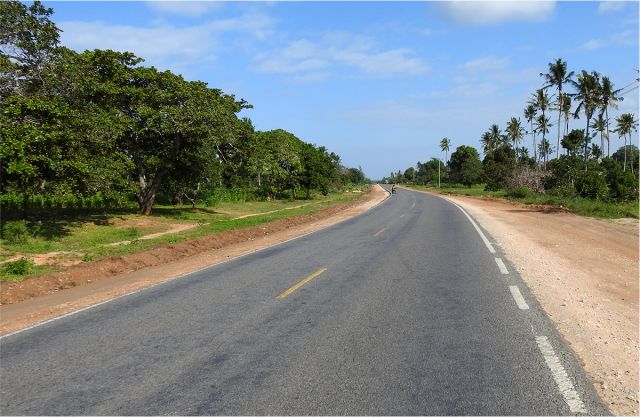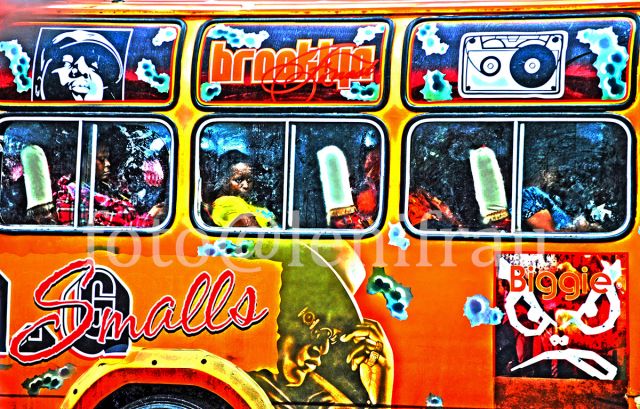
14-09-2023 by Freddie del Curatolo

Browsing through the modern "myths" and references for the latest Kenyan generation, it seems natural to find that American and continental rappers hold sway, along with Hollywood actors and TV series stars, preferably black. Nothing strange under the equatorial sky, where shine as standard-bearers of "quotes" (the quotations) and thoughts, the matatu, means of transportation that have risen to the status of traveling petty philosophies. As I recount in my book "Nairobi," "pop artists, provocative starlets, preachers, criminals or characters from the past are matched with phrases from the Bible or Koran, stanzas from songs or famous sayings. On
Kenyatta Avenue rapper 50 Cent overtakes Che Guevara on a curve, while Beyoncé pulls over and closes the gap on Pablo Escobar." Then there is "Bella Ciao," not a partisan anthem, of course, but the theme song of "House of Paper," but also a Japanese manga and Thor who is as blond and horned as can be. As in, Western or Eastern idols at the antipodes of Africa are fine too, as long as they have something in them that smells of survival, power, revolt or cunning bordering on crime.
In all this, what does Mr. Bean have to do with it?
Next to the black gymnast with gold chains and Ibrahimovic-like pose or the superaccessoriate African-American starlet, the white British misfit looks like a reverse racism provocation, along the lines of "dear mzungu, this is how we see you: lame and puny, old inside and inoffensive."
But once again Kenyans amaze with their unexpected assessments.
Researching the field and delving deeper, I realized that the character created by Newcastle actor Rowan Atkinson, is a benchmark for the Kenyan in the street. You want for the laughter that his movies and gags provoke, but mostly just for his sentences, aphorisms. The famous "quotes" that Kenyans are so fond of that they write them everywhere.
That of mottos and sentences, is a habit, moreover, that the Kenyan people carry from childhood, since it is customary for every school starting from kindergartens, to have its own motto, even before a chair and a desk for each student.
So here it is that in a tuk-tuk rather than on the walls of a small clothes store, on the self-printed T-shirt of a mama selling vegetables at the market or on the wheel cover of a bicycle, one of the little man's mottos with the googly eyes appears. All the way to a successful matatu company that, with Mr. Bean graffitied on the walls and waving on the back of vehicles, has seen its fortunes multiply in a short time. And the owner is hardly a British citizen.
But what are the phrases by which Kenyans identify with Atkinson's creature and not, as it has been for years, with Bob Marley, Nelson Mandela and similar prophets?
Do recently on a tuk-tuk in Mombasa was a large photo of him and next to it his words, "Enjoy your company instead of expecting someone else to make you happy," and "Sitting alone and enjoying your own company is better than being surrounded by fake people."
A "white person" who is more of a loser than someone born into little more than miserable conditions can be heartening, sure.
But even the short maxims taken up in a more ironic and biting way by the matatu make it clear why this empathy goes beyond laughter and eventual mockery.
"Maybe I have no brains, but I have an idea," written on one of the small buses, for example, sounds like a second chance, while "The greatest pleasure in life is doing what people say you can't do" becomes a slogan for borderline turbulents. Also very Kenyan is what I saw written on a wall next to the bean man's face: "If you can't beat them, join them. If it doesn't work, bribe them." Poking around on the net, it sure looks like he uttered it, and not a former local finance minister.
On another matatu, the "quote" was, "If at first you don't succeed, well, there is no point in trying again." And here, for a Kenyan, the alibi served, and in this sense the pale and somewhat autistic gentleman living in the country of the former colonizers has many phrases that can comfort, for example, "sometimes the best solution to a problem is to stop participating in the problem." Tié!
The important thing in the end, between sharing and interpreting for one's own use, is not to lose the welcome and sympathy typical of these parts, because Mr. Bean also says that "the world is a better place when you smile."
NEWS
by redazione

A matatu unleashed at high speed inexplicably into the lane opposite the one of its relevance crashed into an ...
by redazione

After the arrival of TUI charters from Belgium and the Netherlands, and the scheduled flights from Qatar Airways' next 9 December, Mombasa Moi International Airport could be...
NEWS
by Freddie del Curatolo

The holidays are approaching in Kenya, which for local residents also coincide with the summer...
FREDDIE'S CORNER
by Freddie del Curatolo

Nairobi's anarchy is a form of self-management in constant motion. The matatu are certainly the...
NEWS
by redazione

At least 55 people were killed in a horrific road accident in Londiani, northern Kenya's Kericho ...
NEWS
by redazione

Kenya is currently considering, towards the end of August, loosening most of the restrictions still...

In order to prevent a possible Coronavirus epidemic also in its own country, the Government of ...
NEWS
by redazione

A reckless overtaking by a lorry on a stretch with a continuous strip and poor visibility, the extremely violent...